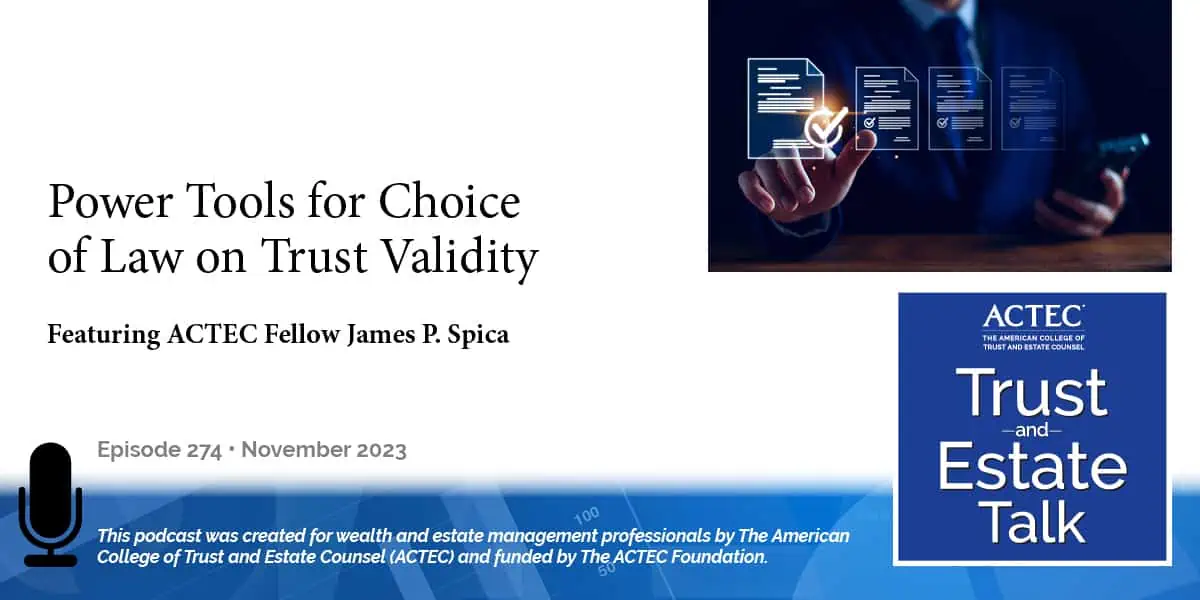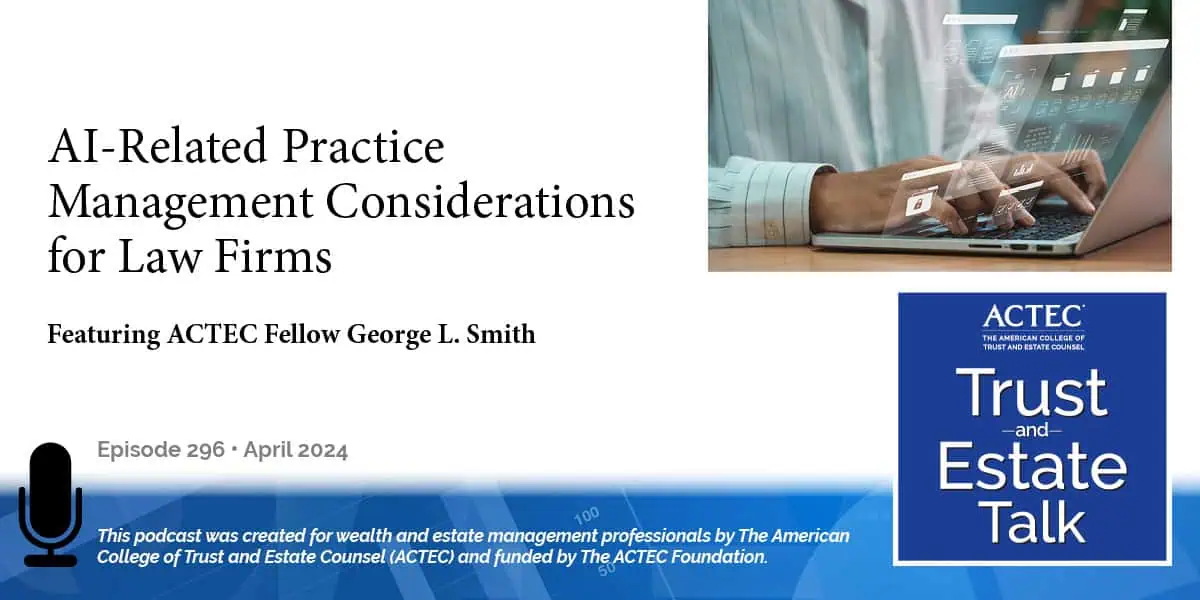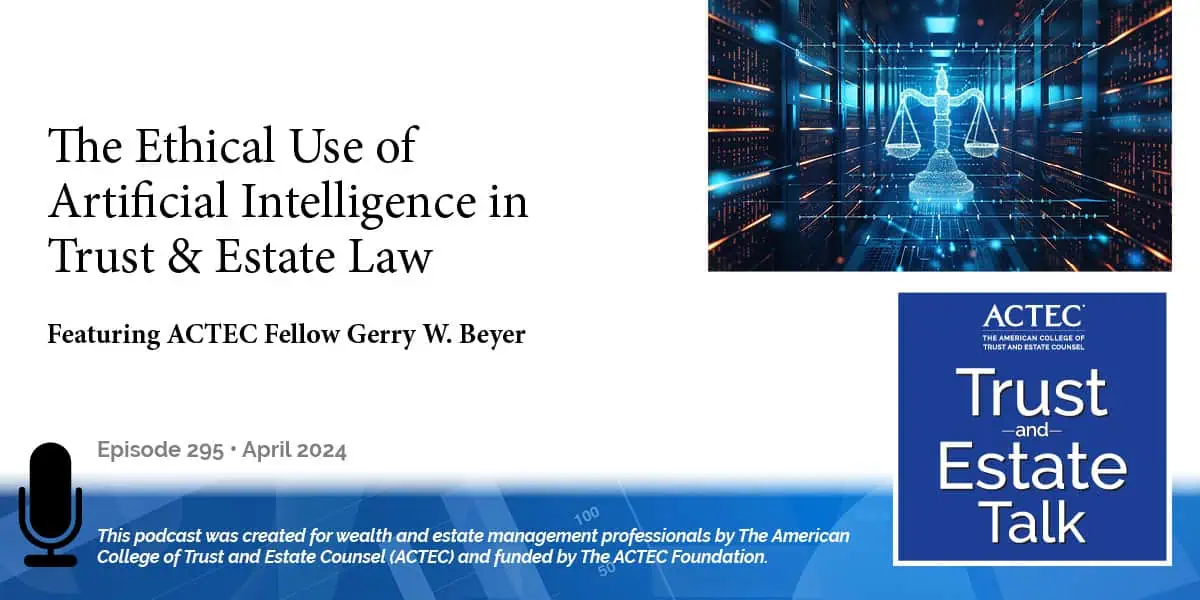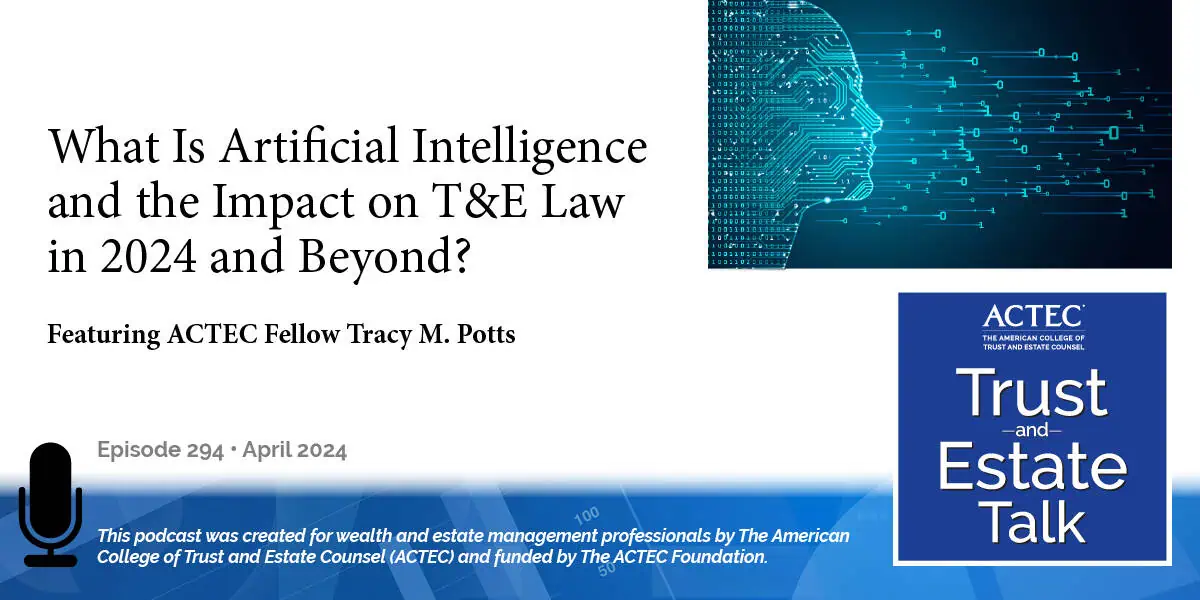Power Tools for Choice of Law on Trust Validity

“Power Tools for Choice of Law on Trust Validity,” that’s the subject of today’s ACTEC Trust and Estate Talk.
Transcript/Show Notes
Introduction
This is Travis Hayes, ACTEC Fellow from Naples, Florida. As trust and estate practitioners, we frequently run into choice of law issues which can affect the validity of a trust, including when trusts are created by an exercise of a power of appointment. ACTEC Fellow Jim Spica of Southfield, Michigan, is joining us today to explain the issue and share his thoughts. Welcome, Jim.
James Spica: Thank you, Travis. The tendency of trusts and powers of appointment to inter-breed in the wild. The frequency, that is, with which trusts are created by exercises of trust-spawned fiduciary and non-fiduciary powers of appointment, has an imperative effect on the content of a state’s choice of law rules. Unless it is constitutionally laissez-faire about what domestic settlors can do with and concerning express trusts, the state is bound to regulate choice of law on the validity of trusts, and it cannot regulate choice of law on the validity of trusts without compatibly regulating the choice of law on the validity of exercises of trust-spawned special powers of appointment.
Choice of Law Issues and Trust Validity
Every state has to regulate what settlors can do with and concerning express trusts. A state that has even one public policy cannot continence, for example, a so-called “purpose trust” for the encouragement of domestic behavior in violation of that policy, whatever it is. The possibility that states will espouse different policies entails a risk of conflicts requiring choice of law.
So a state that wants to regulate what settlors can do with or concerning express trusts in any particular respect in which another state is or maybe more relaxed is bound to add settlors’ ability to determine the choice of law on trust validity to the list of things it wants to regulate lest its choice of law rules should effectively make its local law restrictions on express trusts elective.
Regulating Settlors’ Abilities
Of course, some of the things settlors can do to determine the law governing trust validity will be unobjectionable from the regulating state’s point of view. In a multi-state system, each state is motivated to determine the rule of decision on a given issue, in a given case, by weighing the relative interests of interested states based on connecting factors. Which, in a case involving an express trust, will include, for example, the domicile of the settlor.
What the regulating state wants to avoid is a situation in which the settlor of “Trust T”, eludes the regulating state’s local law restrictions on a matter, “M,” whatever it is, by arranging for the law of relaxed state to govern the validity of T, when the regulating state is the state to which T has its most significant relationship as to M based on the relative interests of interested states. That situation could certainly arise if the settlor of trust T were allowed to designate, in terms of T, the state whose law should govern the validity of T.
Settlor’s Autonomy Constraints
Suppose, for example, the local law of the regulating state provides a surviving spouse a statutory forced share of a deceased spouse’s “augmented estate,” whereas the local law of a relaxed state exempts assets transferred in trust from forced share rules.
If we also suppose that a relaxed state sanctions self-settled trusts and that the regulating state allows settlors to designate state law to govern trust validity, a settlor, “S,” who is domiciled in the regulating state, could try to disinherit her spouse by creating an irrevocable trust, T, in the relaxed state, retaining the rights to receive trust income and to direct trust investments and designating the local law of the relaxed state to govern T’s validity.
Whether states should recognize the settlor’s designations of state law to govern trust validity is debatable. But states commonly do, subject to limitations, and we can assume that regulating states do likewise. In which case, to disarm the threat to policy posed by our hypothetical, the regulating state will enact or judicially recognize the common law rule according to which a settlor’s designation of state law to govern trust validity will be respected only if the designated state has a substantial relation to the trust and the application of that state’s law does not violate what the restatement second of conflict of law’s terms a “strong public policy” of the state with which, as to the matter at issue, the trust has its most significant relationship.
Choice of Law in Trust Validity
These constraints on settlor autonomy, the substantial relation requirement and the public policy override will be associated with a default rule for cases in which the settlor fails to make a designation or makes one that violates one of the settlor autonomy constraints. And the default rule will either itself have the same policy override or will simply designate as the default “the state with which as to the matter at issue, the trust has its most significant relationship.”
We may assume, on the authority of the restatement, that under the choice of law rule just described, regulating the state’s interest in determining the effect of T on S’s augmented estate will outweigh that of a relaxed state. But S has another string to her bow unless the regulating state’s validity of trust rule is supported by a compatible choice of law rule on the validity of exercises of trust-spawned special powers of appointment. To see this, we need only assume that the regulating state has enacted Section 103(2) of the Uniform Powers of Appointment Act, which provides that unless the terms of the instrument creating a power of appointment manifest to contrary intent, the exercise of the power is governed by the law of the powerholder’s domicile.
Validity of Exercises of Trust-Spawned Special Powers
Now, one of the questions to be governed by the law governing the exercise of power is the validity of whatever dispositive arrangement the exercise purports to effect. So, when a trust – T2, is created by the exercise of a power of appointment granted under the terms of a trust – T1 , the state law that governs the validity of the exercise determines the validity of T2. What section 103(2) tells us about such a case is that the state law governs the validity of the exercise of the power, and therefore, the validity of T2 is the law of the domicile of the powerholder – the donee of the power.
Since, by hypothesis, the regulating state has enacted section 103(2), all our hypothetical settlor S has to do is grant a domiciliary of the relaxed state either directly – that is, noma noten – or through the offices of a “trust protector,” a power to appoint the assets of T in trust, subject to the same administrative and dispositive terms for the benefit of the same beneficiaries. In that case, the power’s exercise will make the regulating state’s augmented estate regime irrelevant to the T mimic trust as far as the regulating state is concerned without otherwise altering S’s dispositive arrangement.
Alternative Choice of Law Rules
That’s too easy, right? It is too easy, but on our assumed facts, it works. There is no question of a so-called “fraud on a power” here. The donee will have exercised the T-spawned special power in exactly the way S intended. There is no doubt that, except as prohibited by public policy, the donor of a power of appointment can place extensive, highly detailed conditions on the exercise of a power, and it can hardly be argued that the conditions S has imposed contravene public policy when it is regulating state’s enactment of section 103(2) that does S’s bidding.
By that enactment, the regulating state has said that the law of the domicile of S’s donee should determine the validity of the dispositive arrangement that S has authorized the donee to effect. The point is that it is difficult to imagine why regulating state would knowingly adopt a choice of law rule on the validity of exercises of powers of appointment that can so easily be used to subvert its attempts to regulate disinheritance of spouses, remoteness of vesting, accumulations of income, the performance of non-charitable purpose trusts, the exculpation of trustees and trust directors, the enforceability of spend-thrift provisions in self-settled trusts, settlors’ ability to waive notice of trust existence for beneficiaries- any regulated activity pertinent to express trusts to which some other state turns or might turn a blind eye.
To the extent a state, like a regulating state, understands its motivation to adhere to its validity of trust rules and settlor autonomy constraints, it is bound to reject a validity of exercise choice of law rule like section 103(2) in favor of some alternative that vindicates the intuitive ideas: (1) that for policy purposes, the donee of the T-spawned special power in our hypothetical is effectively acting merely as S’s agent; and (2) that a settlor ought not to be able to achieve trust objectives that are otherwise prohibited by applicable local law simply by interposing a special power of appointment.
Conclusion
On the simple facts of our hypothetical, the choice of law rule on the validity of exercises of trust-spawned special powers described in Section 274(a) of the restatement foots the bill. Invoking the so-called “relation back theory” of special powers, that rule would make the law that determines the validity of T determinative of the validity of the exercise of the T-spawned special power and, therefore, of the T-mimic trust, regardless of the law of the domicile of S’s donee. Restatement Section 274(a) gets into trouble in situations more complicated than our hypothetical, but that and how the restatement rule can usefully be reformed are topics for another day.
Travis Hayes: Thank you, Jim, for discussing the choice of law issues affecting the validity of trusts, including those created through the exercise of a power of appointment.
You may also be interested in:
Latest ACTEC Trust and Estate Talk Podcasts

AI-Related Practice Management Considerations for Law Firms
A discussion for law firms about how to incorporate AI in their practice management, including staff considerations, the “billable hour,” and more.

The Ethical Use of Artificial Intelligence in Trust & Estate Law
A law professor offers insights into the risks, rewards, duties and ethical considerations of lawyers using AI in their T&E practices.

What Is Artificial Intelligence and the Impact on T&E Law in 2024 and Beyond?
A primer on the types and uses of AI, then a deeper dive into the impact on trust and estate law from types to applications to ethical considerations.

